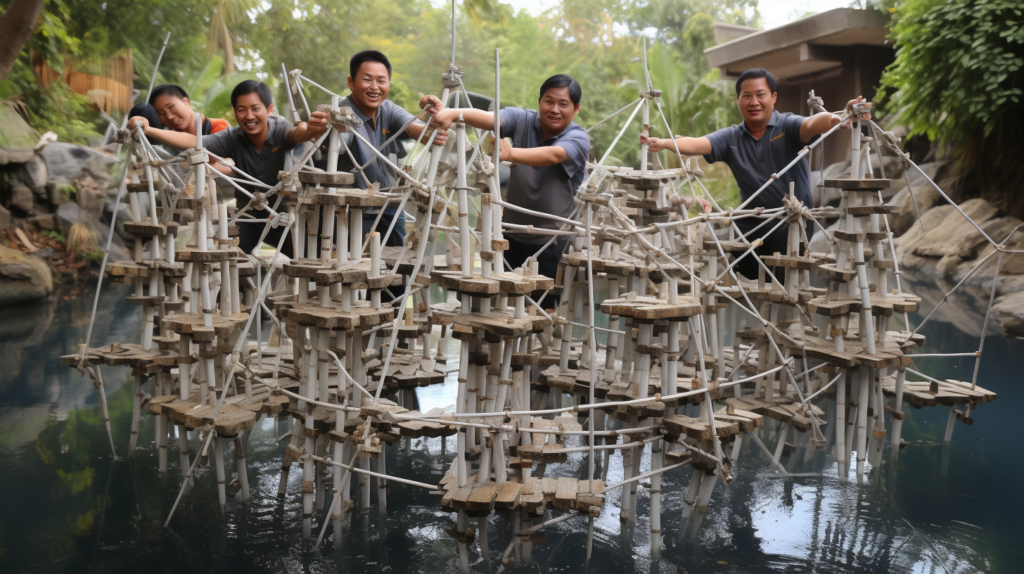When you spend time with loved ones, it’s essential to have the right environment to ensure the most meaningful bond. Whether you plan on spending a few hours or a few days, creating the proper environment for bonding is key to a meaningful experience and a lasting connection. Let’s look at how to create the best experience for everyone involved.
1. Creating the Perfect Atmosphere for Connection
Creating a positive atmosphere for connection is a critical part of any team-building exercise. Think of it as an environment where people feel comfortable enough to share their ideas and be open to collaboration. Here are some tips for setting the stage for fruitful relationships:
- Encourage an attitude of openness through your body language. Make sure everyone can see and hear each other clearly, and use gestures to indicate that everyone’s voices are valued.
- Create a comfortable space in terms of both physical and mental comfort. Make sure the room is well-lit, has comfortable chairs, and doesn’t have distractions that could interfere with the connection process.
- Focus on creating a supportive atmosphere. A successful connection should include empathy, respect, and understanding. Create an environment of trust by enforcing confidentially, so people know their ideas and conversations are kept safe.
Creating an atmosphere of connection isn’t just about setting the right physical environment, it’s also about creating one that’s mentally and emotionally supportive. Remember to focus on building relationships and encouraging open conversation, so everyone can benefit from each other’s insights. Successful connection happens when everyone feels heard and understood.

2. Gain Insight into the Power of Positive Interaction
No matter the industry, the power of positive interactions between individuals can open up a world of new opportunities. Working together towards a common goal can bring a team closer together, but also enhance outcomes and propel subsequent steps forward. The following are three ways to s.
- Constructive Communication: At the core of positive interactions lies the power of communication. Making the effort to share clear and constructive messages can help move conversations forward, while also facilitating deeper understanding. From emails to meetings, fostering healthy conversations can set the stage for success.
- Feedback: The ability to encourage open dialogue is key for positive interactions. Providing disclosure and feedback can further foster relationships and create genuine connection. Not only can feedback help evaluate and develop ideas, but it can also lead to greater trust and openness amongst team members.
- Change: Positive interactions are also beneficial for managing change. Working together to shift a company’s approach or approach to a project can create the possibility for smoother transitions. To help ensure that changes are effective and successful, positive interactions can keep the momentum going and motivate further progress.
Understanding the power of positive interactions can enable teams of all sizes to reach their goals. With this knowledge, individuals can create strategies and approaches that can bring projects and ambitions into clearer focus.
3. Recognizing and Respecting Personal Boundaries
Personal boundaries are invisible lines that define how other people can and cannot interact with you. Respect for another person’s boundaries is important for building trust and creating healthy relationships.
It is important for both parties to recognize and respect each other’s personal boundaries as they can be different for each person. This can mean understanding that different people might have different things that make them feel uncomfortable, and that some types of conversation or behaviour may be entirely off-limits. Everyone has the right to set their own boundaries and to say ‘no’ to people or activities that make them uncomfortable.
For those setting or clarifying their personal boundaries, it’s important to choose your words carefully. You can communicate your boundaries in a way that doesn’t sound accusatory or judgemental. For example, instead of saying ‘you shouldn’t do that’, you can try phrases like:
- “I feel uncomfortable when…”
- “I would appreciate it if you would…”
- “This doesn’t feel right for me…”
Sometimes, however, it’s also important to protect yourself from situations where people have repeatedly demonstrated a lack of respect for your boundaries. In this case, it is important to decide how much distance you feel comfortable putting between yourself and the other person.

4. Understanding the Benefits of Mutual Engagement
Rewards come with hard work, and mutual engagement brings abundant benefits. It forms a basis on which trust and strong relationships can develop between individuals and businesses or groups. It also allows for the exchange of ideas, enabling the fostering of mutual understanding and avoiding conflicts that could arise from incorrect understanding of situations. can lead to meaningful progress.
Effective mutual engagement can ensure that each individual gets to know each other in detail and understand each other’s needs more accurately. It also helps build people-to-people partnerships, create an atmosphere conducive to discussion, and strengthen relationships among all the parties involved. This type of engagement cultivates goodwill, encourages cooperation, and makes it easier to find points of agreement.
Mutual engagement also improves business decisions and makes them more effective. By sharing ideas and opinions with a common goal for the betterment of all, decisions are made with increased insight and accuracy. This makes them nimble and helps develop better strategies that take into account all factors. This is beneficial to both individual organisations and the collaboration as a whole, which in turn drives growth.
- Mutual engagement leads to understanding
- Engagement cultivates goodwill and cooperation
- Mutual engagement improves business decisions
5. Exploring Intimacy by Sharing Openly and Honestly
Investing in relationships
Being able to explore your own and your partner’s needs for intimacy is a vital part of building a secure and healthy relationship. This means investing effort and time in understanding what makes your partner feel most connected to you and what gives them a sense of safety. All of this requires that both partners become comfortable with sharing openly and honestly.
The greatest benefit of sharing openly and honestly is that it provides each partner with a deep level of understanding of the other. This allows for greater self-awareness and acceptance of each other, creating an environment where goals, fears, and dreams can be shared safely and with full confidence.
One practical way to explore intimacy and share openly is to talk about the small or big things that drive each of you. Bring up topics you don’t discuss often, ask each other questions, explore activities that bring you both closer together, and open up about what you enjoy in life. Be curious about each other’s answers, while offering your own – this is an excellent way to draw a connection and strengthen the bond within the relationship. Some topics you can discuss as a couple are:
- What makes each other feel most loved?
- How does each of you nurture a sense of security in the relationship?
- How does your partner make you feel special?
- What are the areas that your partner can help you develop in life?
Having these conversations can help deepen a bond built on transparency and understanding. Give each other open and honest answers to the questions asked and enjoy the journey of discovering the different layers to your relationship.

6. Finding Comfort in the Company of Others
Having a strong social network can be a comforting force in life. Sometimes it’s easier to talk to a stranger about personal matters than with a family member because you can open up without fear of judgement. When you open your heart and mind to someone you can come away from that conversation feeling heard and validated. Here are some suggestions on how to find comfort in the company of others.
- Seek out support groups – Support groups are great for people facing the same challenge. Whether it’s managing a chronic illness, addiction, or responding to a traumatic experience, hearing from others who are in a similar boat can lift your spirits and give a greater sense of hope and community.
- Participate in volunteering activities – Volunteering with people who care about the same causes as you can help you find a sense of purpose. Helping others can be incredibly rewarding and can also give you a common interest to talk about.
- Connect with old friends – Staying in touch with old friends over the years can be just the reminder you need that you’re not alone. Keeping up meaningful conversations can remind you that there are familiar people who have known you for a long time that you can turn to for a listening ear.
Having just one good person to talk to can be dramatically life changing. Remember, it’s ok to find comfort in the people around you. More often than not, they can help you to find strength and resilience when life gets tough.
7. Experiencing Mutual Respect and Acceptance
Mutual respect and acceptance are essential aspects of building and maintaining strong relationships. Being mindful of the needs of yourself and others is essential in making sure everyone feels heard, known, and welcomed in any scenario. Here are a few tips to help you maintain mutual respect and acceptance:
- Put yourself in someone else’s shoes. Try to understand a person’s point of view and values, even if your own are different. This will help you to appreciate and accept them where they are.
- Be considerate of someone’s emotions. Everyone has feelings and responding with empathy helps foster trust and understanding between parties.
- Listen actively. Listen to what people are saying and avoid responding to every statement with your own personal experience. Respect the uniqueness of each person’s experience and validate it.
By creating mutual respect we also make room for accepting each other’s differences. Being open-minded about people’s different beliefs, values, and opinions can be especially difficult if you personally don’t agree with them. But learning to respect differences can enhance any relationship regardless of the disagreement.
Finally, it’s important to be self-respecting. Take a moment to assess what you’re worthy of and recognize that you have boundaries. Let others know how you will and will not be treated so that everyone involved can maintain appropriate expectations for each other.

8. Cultivating Joyful and Lighthearted Moments
As life continues to get busier and increasingly filled with stress, moments of joy and lightheartedness can quickly start to feel far out of reach. That’s why it’s even more essential to start cultivating moments of joy and lightheartedness into your daily routine to keep your spirits up. Here are a few ideas you can try out:
- Take a break to shake it up. Whether you rock out to some of your favorite tunes or take a few moments to laugh uncontrollably, shaking up the energy in your work with joy and lightheartedness can be the perfect rejuvenation tool.
- Allow yourself to be curious. Not only should you explore the world around you but also allow yourself to explore and unearth the depths of your own heart and soul. Simply strolling through nature or taking a seat in the garden are easy ways to get started.
- Connect with your playful side. Showing your playful side doesn’t have to feel like a detour. You can still get your work done, but make sure to intersperse moments of joy and lightheartedness as you do it.
Making it a part of your routine. For moments of joyful moments and lightheartedness to really stick, make sure to make it a part of your daily routine. Dedicate some of your lunch or free time to doing something that brings joy and light into your life.
It may seem like a challenge to carve out moments from your busy day but it’s ultimately worth it. After all, joy and lightheartedness are essential ingredients to a life well-lived!
9. Gratitude for Ideas, Opinions, and Laughter
Ideas, opinions, and laughter may sometimes cost us nothing, but the impact they have on our lives is far greater than the price of admission. Many of us don’t realize how much these small gifts can mean for someone else.
So it’s time to express a collective gratitude for those innovative minds, that never-ending torrent of dialogue, and the countless comedic relief! Giving thanks for:
- The truly original ideas
- The incredibly passionate opinions
- The consistently creative laughter.
We need to take a step back and pay homage; for ideas, opinions, and laughter, provide a sense of community and connection, allowing us to engage with one another; stimulating the imagination and helping us to broaden our view of the world.
10. Enjoying Quality Time for Bonding and Getting to Know Each Other
Spending quality time with loved ones can improve relationships and help people to better understand one another. Here are some ideas for making the time spent with those closest to us more meaningful:
- Plan a special evening that everyone will enjoy. This could be dinner at a restaurant, baking cookies together, or engaging in an outdoor activity such as taking a walk.
- Participate in a group activity that everyone can participate in, such as a card game or a friendly competition.
- Go out of your comfort zone and try something new, like going to a local event or painting ceramics.
- Find something that is meaningful to each person that you can share and discuss.
Connecting with family and friends in a meaningful way can help build deeper relationships and trust. Some additional activities that can help with bonding and getting to know each other better include:
- Reading a book together and discussing it afterwards.
- Watching a film or engaging in an activity and then talking about it afterwards.
- Making a list together of things everyone would like to do in the future.
- Asking meaningful questions that get to the root of why someone does something or how they feel about a particular topic.
No matter what activity you choose, taking the time to spend meaningful moments with those closest to you will help create and strengthen bonds.
Create lasting memories together and be sure to foster the right environment for it. The best bonding experiences come with love, care, and respect. Create a safe and pleasant atmosphere so the bonds you forge will never be forgotten.
